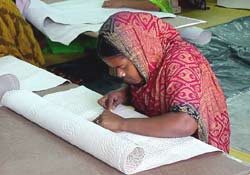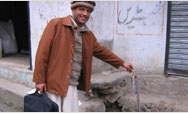You are here » Home » Telling Our Story
Case Study
Businesses introduce new products and form cooperatives to increase market reach
New Products Expand Exports

| |
Photo: USAID/Troy Beckman
|
|
A woman embosses leather that will be used to manufacture handbags and shoes for export.
Bangladesh's diversified product offerings have generated new markets in Europe and Japan.
|
Challenge
With the expiration of the international Multi-Fiber Agreement on January 1, 2005, Bangladesh's ready-made garment industry was suddenly destabilized. For over 30 years, the agreement had artificially protected Bangladesh's number one export from competition, and removing the quota system could result in a dramatic loss of jobs and extremely adverse effects on the national economy. To give balance to the export industry and compensate for revenue loss in the garment sector, Bangladesh needed to increase the diversity of its products to make them more attractive to the international market.
Initiative
USAID is helping to develop Bangladesh's small and medium-sized enterprises by identifying promising new sectors, enhancing business management practices and introducing new technology and production techniques to unskilled workers. It is also creating linkages between large export companies and small, community-based cooperatives. Energetic entrepreneurs are selected to train and operate these co-ops, which manufacture a variety of products for the exporters using local materials. This creates new jobs in rural areas and generates income for poor families. An emphasis is placed on training women, who make up 80 percent of the cooperative workforce.
Results
Leather goods, handmade stationery, handmade floor coverings, personal protective equipment and light electrical products are among the ten industry sectors USAID has helped to develop. In addition, more than 80 cooperative have established linkages with the larger export companies. Since 2000, export sales of participating businesses have reached $52 million. Firms receiving USAID support have also added 5,000 jobs, with a vast majority of the new positions going to women. Bangladesh's diversified product offerings have also generated new markets in Europe and Japan.
Print-friendly version of this page (244kb - PDF)
Click here for high-res photo
Back to Top ^ | 

